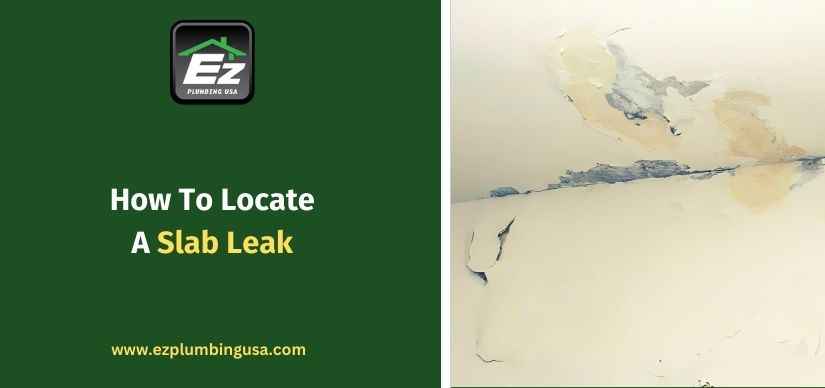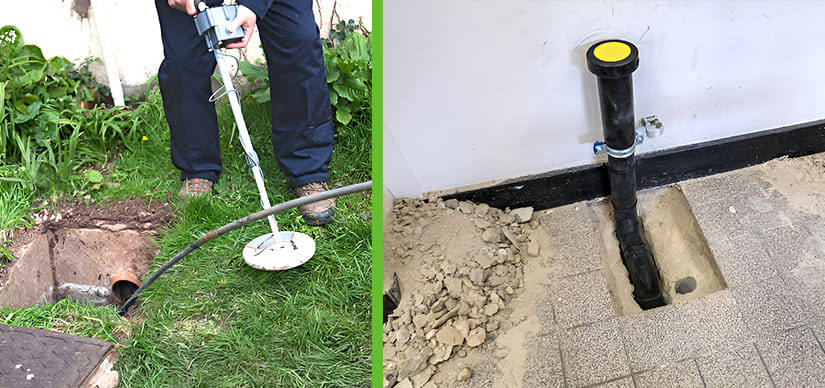How To Locate A Slab Leak
Views : 586

What Is Slab Leak?
- Damages to the foundation
- Growth of mold and water damage
- Increased water bills
- Structural instability
Common Signs of Slab Leakage
- Increased Water Bills
The surge in the water bill without the water consumption changing can be attributed to a slab leak. The leak would run continuously and waste a lot of water, hence increasing your bill. - Warm Areas on the Floor
Underneath a slab, if there is leaking hot water piping, you will feel unusually warm spots on the floor. This is a common sign of a hot water slab leak. - Wet Carpets or Warped Floors
A slab leak allows excess moisture to seep into floors, which causes carpets to feel damp or wooden flooring to warp. Unexplained moisture signals a need for slab leak detection in San Diego. - Mold or Musty Odor
In the standing water created by a slab leak, mold and mildew flourish. If you detect musty odor or see mold down the walls or along baseboards, a leak might just be the culprit. - Cracks in Walls and Floors
With time, the leaking water from under your foundation causes slight shifts in the structure to occur, hence causing cracks to start presenting in walls, floors, or ceilings. Upon noticing newer cracks, perhaps some slab leak repair in San Diego is due.
How To Locate a Slab Leak
1. Check Your Water Meter
- Shut off all water sources in your home.
- Do read the water meter and record the reading.
- Do not use water for a half-hour from now.
- If your water meter is spinning constantly, there must be a leak.
2. Sound of Running Water
3. Inspect the Flooring
4. Inspect for foundation cracks
5. Consult an Expert for Leak Detection
- Acoustic listening devices for detecting the movement of water
- Infrared cameras for the detection of moisture accumulation
- Electronic leak detection to determine the leak's origin
Slab Leak Repair Methods
- Pipe Rerouting
If it is just a small section of pipe that is leaking, the plumbers can reroute the water line above ground to avoid opening up the slab. This is fairly inexpensive for minor leaks. - Epoxy Pipe Coating
In case of small leaks, plumbers may resort to epoxy pipe lining to seal the cracks without digging. This technique is ideally used for older homes with decayed pipes. - Direct Access Repair
For large leaks, the slab may have to be broken to replace the damaged section of pipe. This option is invasive but guarantees a permanent fix. - Whole-House Repiping
In cases of older and corroded pipes, replacing pipes for the whole system is the best long-term solution to prevent further leaks.
When to Call for Emergency Plumbing Service
- Water pooling inside your home
- Sudden loss of water pressure
- Large cracks running along the foundation
- Multiple plumbing issues at once
Preventing Future Slab Leaks
- Monitor Water Pressure: High water pressure can definitely stress pipes, thus causing leaking.
- Schedule Regular Inspections: Plumbing inspections performed annually will help to detect potential issues early.
- Use Quality Materials: If your project is repiping, use copper or PEX piping for better durability.
- Maintain Proper Drainage: Ensure that gutters and landscaping are working adequately to divert water away from the foundation so as to avoid soil shifting.
Conclusion
FAQs
Q1. What will repair costs be for slab leaks in San Diego?
Price ranges are set based upon the location and severity of a leak: small slab leaks may cost about $500 to repair, while large slab leaks requiring excavation may exceed $3,000.
Q2. What is the lead time for slab leak detection?
Well, generally, slab leak detection would take anywhere from about 1 hour to 2 hours, depending on other factors concerning the volume of the work involved and the equipment utilized.
Q3. Can I repair a slab leak myself?
While you may be able to reasonably ascertain the occurrence of a leak, do not attempt to repair it yourself. Slab leak investigation requires specialized equipment to correctly find and fix a leak, which should be done by a professional plumber.
Q4. Does homeowners' insurance cover slab leak repair?
That depends on your insurance policy. Several insurance plans cover damages resulting from the leak but not pipe replacement. Always double-check with your provider.
Q5. What will happen if a slab leak is ignored?
Any slab leak that an owner decides to ignore will lead to damage to the foundation, mold growth, and swollen water bills. Call for emergency plumbing service at the first hint of a problem.




